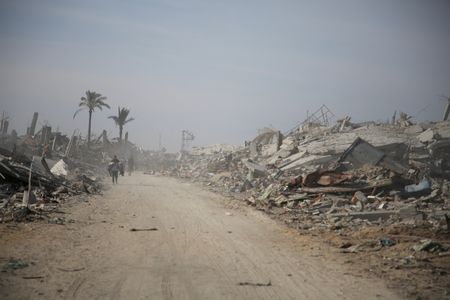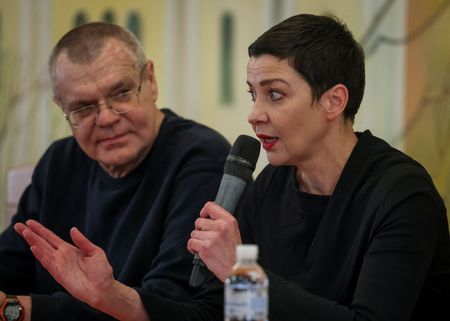By Maayan Lubell
JERUSALEM (Reuters) – Some of the hostages released from Gaza so far during the ceasefire had been held in Hamas tunnels for up to eight months straight, deprived of daylight and with little to no human contact, an Israeli general said on Monday.
Three Israeli civilians and four soldiers – all women – have been released so far in the ceasefire, which began on Jan.
19. In return, Israel has released 290 Palestinian convicts and detainees.
“Some of them told us that they’ve been in the past few months, that they’ve been through the entire time, in tunnels, underground,” deputy chief of the Israeli military’s medical corps, Colonel Dr.
Avi Banov, told journalists online.
“Some of them were alone through the entire time they were there,” he said. “Those who said they were together were in better shape.”
The Israeli military oversees the first health checks that the hostages receive upon their arrival in Israeli territory.
Reuters was unable to reach Hamas’ armed wing for comment but it said on Saturday that it maintains hostages’ wellbeing.
The hostages said their treatment improved in the days leading up to their release, Banov said, when they were allowed to shower, change their clothes and received better food.
They appeared to be in good condition and smiling in videos on the days of their release.
Citing the hostages’ privacy, Banov would not say whether any of the seven bore signs of torture or abuse.
Some had not received proper treatment for wounds sustained when they were captured during the Hamas-led attack on Israel on Oct. 7, 2023, and some showed signs of “mild starvation”, Banov said.
The three civilians, released on the first day of the ceasefire, were discharged from hospital on Sunday.
The four soldiers, freed in the ceasefire’s second swap on Saturday, were still being treated in another medical centre.
Eitan Gonen, father of 24-year-old Romi Gonen who was released on Jan.
19, told Israel’s public broadcaster Kan: “Romi is amazing. We met a mature, amazing woman who stunned us all.”
Gonen would not elaborate on her medical condition or details of her ordeal.
But he said that while in captivity she had heard some of the radio interviews he had given.
“Even if only 10% of the interviews reach the hostages’ ears, it is enough to give them strength,” he said.
“It gave her a lot of strength, energy and great hope.”
More than 250 hostages were abducted in the Hamas attack in October 2023. Around half were released the following month during the war’s only previous truce, and others have been recovered dead or alive during the fighting.
Israel still lists 90 captives in Gaza, with around 30 declared dead in absentia.
Twenty-six women, children, elderly, ill or injured hostages are still meant to be released in the six-week first phase of the ceasefire.
Hamas provided a list late on Sunday detailing their condition.
Israeli authorities have said that they believe most due to be released in the first phase are alive and they fear for the lives of the rest.
They have given no new details since receiving the list.
Banov said he expected that some of next hostages “will be more ill and also people who have died during their time in Gaza”.
(Reporting by Maayan Lubell; Editing by James Mackenzie and Peter Graff)












